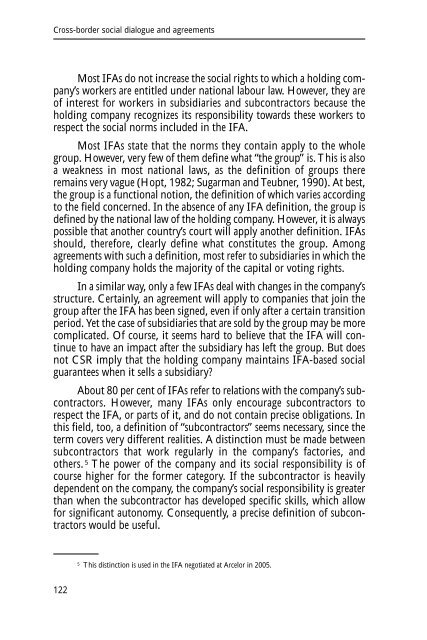CROSS-BORDER SOCIAL DIALOGUE AND AGREEMENTS: An ...
CROSS-BORDER SOCIAL DIALOGUE AND AGREEMENTS: An ...
CROSS-BORDER SOCIAL DIALOGUE AND AGREEMENTS: An ...
You also want an ePaper? Increase the reach of your titles
YUMPU automatically turns print PDFs into web optimized ePapers that Google loves.
Cross-border social dialogue and agreements<br />
Most IFAs do not increase the social rights to which a holding company’s<br />
workers are entitled under national labour law. However, they are<br />
of interest for workers in subsidiaries and subcontractors because the<br />
holding company recognizes its responsibility towards these workers to<br />
respect the social norms included in the IFA.<br />
Most IFAs state that the norms they contain apply to the whole<br />
group. However, very few of them define what “the group” is. This is also<br />
a weakness in most national laws, as the definition of groups there<br />
remains very vague (Hopt, 1982; Sugarman and Teubner, 1990). At best,<br />
the group is a functional notion, the definition of which varies according<br />
to the field concerned. In the absence of any IFA definition, the group is<br />
defined by the national law of the holding company. However, it is always<br />
possible that another country’s court will apply another definition. IFAs<br />
should, therefore, clearly define what constitutes the group. Among<br />
agreements with such a definition, most refer to subsidiaries in which the<br />
holding company holds the majority of the capital or voting rights.<br />
In a similar way, only a few IFAs deal with changes in the company’s<br />
structure. Certainly, an agreement will apply to companies that join the<br />
group after the IFA has been signed, even if only after a certain transition<br />
period. Yet the case of subsidiaries that are sold by the group may be more<br />
complicated. Of course, it seems hard to believe that the IFA will continue<br />
to have an impact after the subsidiary has left the group. But does<br />
not CSR imply that the holding company maintains IFA-based social<br />
guarantees when it sells a subsidiary?<br />
About 80 per cent of IFAs refer to relations with the company’s subcontractors.<br />
However, many IFAs only encourage subcontractors to<br />
respect the IFA, or parts of it, and do not contain precise obligations. In<br />
this field, too, a definition of “subcontractors” seems necessary, since the<br />
term covers very different realities. A distinction must be made between<br />
subcontractors that work regularly in the company’s factories, and<br />
others. 5 The power of the company and its social responsibility is of<br />
course higher for the former category. If the subcontractor is heavily<br />
dependent on the company, the company’s social responsibility is greater<br />
than when the subcontractor has developed specific skills, which allow<br />
for significant autonomy. Consequently, a precise definition of subcontractors<br />
would be useful.<br />
5<br />
This distinction is used in the IFA negotiated at Arcelor in 2005.<br />
122
















